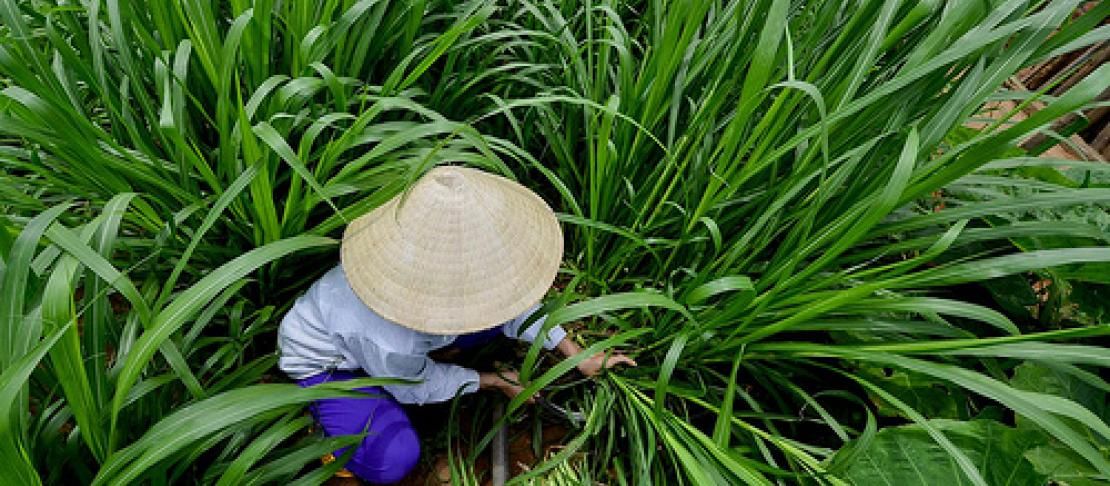Climate change research hub opens in Vietnam

Hanoi, 7 May 2013 A new international research hub has opened in Hanoi, Vietnam, to develop climate-smart farming technologies that reduce the impact of climate change on food production in Vietnam and across Southeast Asia.
The CGIAR Research Program on Climate Change, Agriculture, and Food Security (CCAFS) Southeast Asia regional office in Hanoi will support the work of many contributing international and Vietnamese research and development partners as they work toward providing solutions to ensure climate-smart agriculture in the region.
“Vietnam is the country most vulnerable to climate change in Southeast Asia,” said Dr. Robert Zeigler, director general of the International Rice Research Institute (IRRI), one of the participating organizations and host of the new office. "The Mekong Delta in Vietnam supplies the country with around 20 million tons of rice per year, about half of the country's total production. This supplies not only Vietnamese rice consumers but also other rice consumers around the globe because Vietnam is the second-largest exporter of rice in the world.
“If we want to make sure that those people dependent on Vietnam’s rice production – including many living in poverty – have enough rice to eat, we must help Vietnamese farmers to keep producing affordable rice in the face of climate change,” he added.
The new CCAFS research hub will ensure more resources and people on the ground to increase the ability of all partners to undertake research and work closely with local partners.
Started in 2011, the CCAFS program brings together the world’s best researchers in agricultural and climate science. With active regional programs in East and West Africa and South Asia, the program’s expansion into Southeast Asia promises new opportunities and innovations for smallholder farmers facing climate change. “We look forward to working with partners in Southeast Asia and sharing what we’ve learned from other parts of the world,” said Dr. Bruce Campbell, program director of CCAFS.
Climate change research is already underway to help Vietnamese farmers. In the Vietnamese province of Bac Lieu, rice farmers experience saline conditions and a lack of water that make it difficult to grow rice.
By adopting a water-saving practice called alternate wetting and drying, they have reduced their water use without compromising their yields. Salt-proof rice varieties are also being developed that will give farmers a fighting chance against salinity.
“There are many excellent examples of climate-smart agriculture in Vietnam that could potentially be adapted for countries in Africa and other regions,” added Dr. Campbell. “The CCAFS program wants to use the best knowledge available to develop approaches that can be scaled up to reach hundreds and thousands of vulnerable farmers around the world.
Fast Facts:
- A research hub will open in Hanoi, Vietnam, to facilitate climate change research and collaboration for Southeast Asia.
- Vietnam is the country most vulnerable to climate change in Southeast Asia.
- Vietnam is a major global producer and exporter of foods – including rice. Ensuring it can continue producing food in the face of climate change will help to improve global food security.
About CCAFS
The CGIAR Research Program on Climate Change, Agriculture and Food Security (CCAFS) is a strategic partnership of CGIAR and Future Earth. CCAFS is supported by the CGIAR Fund, the Danish International Development Agency, the Australian Government Overseas Aid Program, Irish Aid, Environment Canada, Ministry of Foreign Affairs for the Netherlands, the Swiss Agency for Development and Cooperation, Instituto de Investigação Científica Tropical (IICT), UK Aid, the European Union (EU), with technical support from the International Fund for Agricultural Development (IFAD). The Lead Center of CCAFS is the International Center for Tropical Agriculture (CIAT).
Media Contact:
IRRI: Bianca Ferrer, (English), +63 2 580 5600 ext. 2587 (Philippines), b [dot] ferrer [at] irri [dot] org